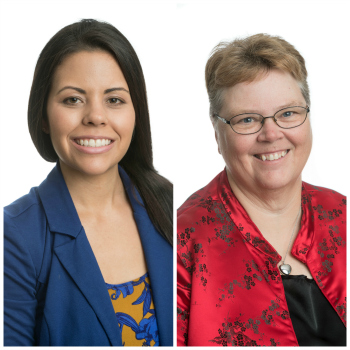Recently, two School of Education faculty members attended the American Counseling Association’s 2017 Conference and Expo in San Francisco. Associate Professor Laurie Carlson, program coordinator for the Counseling and Career Development specialization, and Assistant Professor Jessica Gonzalez represented CCD at the four-day conference.
Opportunity to connect, learn, and share

Carlson and Gonzalez leveraged the conference as an opportunity to connect with colleagues, learn about new research, and participate in education sessions by prominent authors and counselors in the profession, including Irvin Yalom, Samuel T. Gladding, and Robert E. Wubbolding. Gonzalez, whose courses use books by those individuals, was especially affected by these authors’ sessions.
“It was fun to bring the stories I heard from these authors back to my students,” she says.
While learning from colleagues and field experts was an integral part of the conference experience, Carlson and Gonzalez were able to associate with conference attendees in other ways. Through her connection to ACA’s president—and Carlson’s former professor—Catherine Roland, Carlson interacted with the conference leadership team.
During the 2017 ACA Conference Townhall discussion session, Gonzalez presented as a panel member for a session titled, “Social Justice Advocacy—What’s Your Role?” Other panel members included journal editors, a past ACA president, and professors and assistant professors from various institutions. Panelists discussed the role of counselors and counselor educators in today’s political climate, as well as topics of equity, diversity, and inclusion.
Invited to join the panel by a colleague who knew Gonzalez’s background in advocacy leadership, as well as her research on multicultural competence, Gonzalez emphasized the importance for counselors to become aware of their own positionality and how that changes depending on their clients and environment. This positionality relates to socioeconomic status, sexual orientation, gender, ethnicity, etc. Gonzalez says that taking time to recognize and reflect on their own privileges before helping clients will help counselors to better serve clients. Additionally, Gonzalez encouraged session participants to “do something practical—put yourself out of your comfort zone and learn about a population you don’t typically work with.”
Value of attending conferences
Carlson and Gonzalez were reminded of the importance of self-care for counseling professionals, as well as the intrinsic benefits of attending conferences. Carlson shares that she felt the conference renewed her sense of purpose as a counseling educator, reminding her that she has a positive impact on her students learning to counsel others. Gonzalez feels the opportunity to leave her day-to-day environment to interact with industry professionals is invigorating, and helps her in continuing to expand her knowledge on the latest trends in the field. Both CCD faculty members encourage their students and colleagues to attend the ACA conference in the future.
“There are many viable reasons that individuals feel they cannot attend a national conference,” says Carlson, “but I would encourage you to plan ahead and work to secure the resources to go. It is something that you can do not only for yourself, but also for your clients.”
One opportunity to fund conference travel is the new travel mini-grant program, recently launched by the School of Education.
About the 2017 ACA Conference
The 2017 ACA Conference and Expo was originally slated to be held in Nashville; however, recent passage of a bill by Tennessee legislature allows Tennessee counselors to deny their services based on the provider’s “strongly held principles.” This legislation, targeting the LGBTQ community, is a direct violation of the ACA’s Code of Ethics, leading the association to move the conference location to San Francisco. This move, seen as an opportunity by conference organizers to reinforce its theme and tagline, “One Community,” enhanced the energy felt among the 3,000-plus counselors from across the U.S. in attendance.
Carlson commented, “To me, this demonstrated my professional association’s sensitivity to diversity and oppression, mobilizing to make a statement regarding our professional ethics and standards.”
The School of Education is part of CSU’s College of Health and Human Sciences.